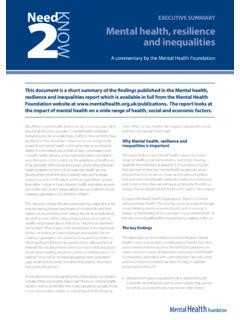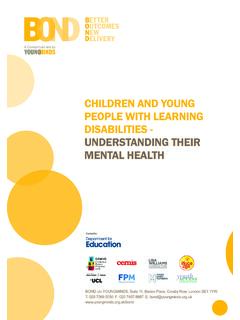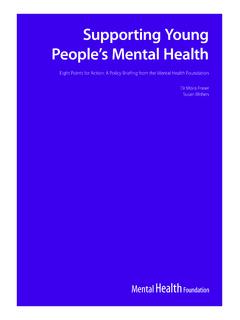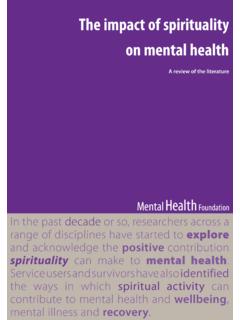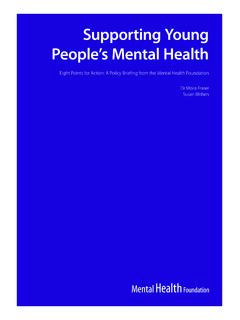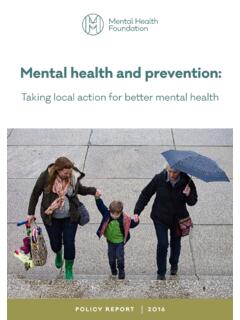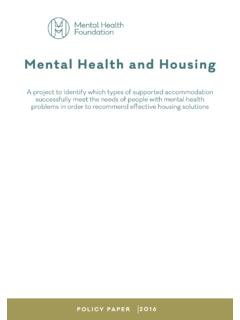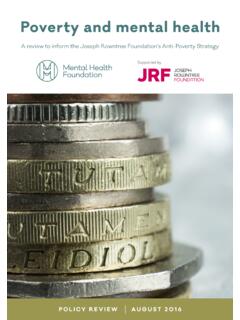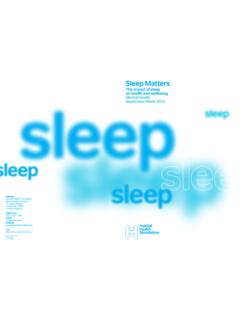Transcription of RESEARCH REPORT - Mental Health Foundation
1 1 RESEARCH REPORT23 Citation: Mental Health Foundation (May 2018). Stress: Are we coping? London: Mental Health FoundationProduced by: Chiara Samele, Harry Lees-Manning, Victoria Zamperoni, Isabella Goldie, Lucy Thorpe, Emily Wooster, Toni Giugliano, Chris O Sullivan, Antonis Kousoulis, Josefien Breedvelt, Mark Rowland & Richard GrangeGood Mental Health is fundamental to thriving in life. It is the essence of who we are and how we experience the world. Yet, compared to physical Health , so little is commonly known about Mental ill Health and how to prevent it. That must Mental Health Foundation is the UK s charity for everyone s Mental Health . With prevention at the heart of what we do, we aim to find and address the sources of Mental Health must make the same progress for the Health of our minds that we have achieved for the Health of our bodies. And when we do, we will look back and think that this was our time s greatest contribution to human Mental Health Foundation is a UK charity that relies on public donations and grant funding to deliver and campaign for good Mental Health for is stress?
2 How many people feel stressed?How does stress affect us physically?How does stress affect us psychologically?What makes us stressed?Distribution of stress across the populationHow can stress be addressed and managed?Conclusion and Recommendations46810131719242354 WHAT IS STRESS?5454 While we all know what it feels like to feel overwhelmed or unable to cope with the pressure we face, when it comes to RESEARCH around stress, it can be surprisingly difficult to pin-point what exactly stress is. At the most basic level, stress is our body s response to pressures from a situation or life event (called a stressor ). What counts as a stressor can vary hugely from person to person and differs according to our social and economic circumstances, the environment we live in, our genetic makeup and physiology. Some common features of stressors include experiencing something new or unexpected, something that threatens your competence/ego, and a feeling of little control over a we encounter a stressor, an important pathway in our body and brain, the hypothalamic-pituitary-adrenal (HPA) axis, is stimulated to produce stress hormones (cortisol and catecholamines) that trigger a fight or flight response.
3 Our immune system is also activated to prepare for possible This process helps us to respond quickly to dangerous , this stress response can be an appropriate, or even beneficial reaction. The resulting feeling of pressure from the stress response can help us to push through situations that can be nerve-wracking or intense, such as running a marathon, or giving a speech to a large crowd. We can quickly return to normal (called homeostatic baseline ) without any negative effects on our Health if our exposure to the stressor is Many people are able to deal with a certain level of stress without any lasting adverse effects. This ability to resist and grow our resistance to stressors (sometimes called resilience ) varies between individuals according to their genetics, experiences, and the environment in which they find many of us there are times when exposure to stressors become too frequent or too intense to deal with.
4 If our stress response is activated repeatedly, or it persists over time without recovery periods, the physiological effects result in cumulative wear and tear on the body (or allostatic load) and can cause us to feel permanently in a state of fight or flight .4 Rather than helping us push through, this pressure can make us feel overwhelmed or unable to cope. While stress is not a Mental Health problem in and of itself, experiencing overwhelming stress for a long period of time is often called chronic, or long-term stress, and it can impact on both physical and Mental Health . This overwhelmed feeling is what we refer to as stress throughout this is our body s response to pressures from a situation or life on how many people in the UK population as a whole are affected by stress is very limited. However, our new survey found that over the past year, almost three quarters (74%) of people have at some point felt so stressed that they felt overwhelmed or unable to cope.
5 The survey, commissioned by the Mental Health Foundation and undertaken by YouGov, polled 4,169 adults in the UK in This stress study had a sample size of 4,619 respondents. Another recent poll concurs with this finding with 82% of people feeling stressed at least some time during a typical week, and eight percent that felt stressed all the area of stress that is frequently researched is self-reported work-related stress. The number of people experiencing work-related stress, as well as Mental Health problems such as anxiety, or depression in the UK has remained broadly stable since 2006/7 but nevertheless persistent. Around half a million people are experiencing work-related stress in the The literature on stress at work suggests several models of stress in the workplace. One model posits that a lack of balance between effort and reward can cause stress. Another suggests a lack of balance between demands made by a job, and the control given to manage tasks, may contribute to recent poll found that women REPORT more stress than men (89% vs.)
6 76%)8 This may be the case both in general, and in the Certain ethnic groups also experience more work-related stress (particularly African-Caribbean women), which has been linked to reported incidents of people become much older (70 years and over) they very often have to deal with long-term Health problems or disability, the loss of friends and family and coming to terms with their own mortality, but interestingly they have been found to REPORT less One previous poll found that people aged 55 and over REPORT the least amount of stress, with 29% reporting not being stressed at This can also be seen in our survey, where 30% of those aged 55 plus reported never feeling overwhelmed or unable to cope in the last year, compared to 7% of young adults (aged 18-24).iAll figures, unless otherwise stated, are from YouGov Plc. Total sample size was 4,619 adults. Fieldwork was undertaken between March 29th and April 20th, 2018.
7 The survey was carried out online. Figures have been weighted and are representative of all UK adults (aged 18+).74% of people have at some point felt so stressed that they felt overwhelmed or unable to impact of long-term stress varies enormously from person to person and can have far reaching consequences if left unmanaged. People may notice that their sleep and memory are affected, their eating habits change, and/or they feel less inclined to exercise. Some people may smoke, consume more alcohol or take drugs to relieve stress. In our survey, of adults who reported experiencing stress, 46% reported that they ate too much, or ate unhealthily due to stress. 29% reported that they started drinking or increased their drinking, and 16% reported that they started smoking or increased their stress, and the associated stress response, can also impact on our physical Health in other ways. In terms of specific physical Health problems, stress can affect our gastrointestinal system as our brain activity and gut are closely inter-connected.
8 Irritable bowel syndrome, for instance has been associated with psychosocial stressors ( work-related stress, money problems, lack of social support).13 Stomach ulcers are a classic example of the impact of stress and gastrointestinal attention has also been given to the link between stress and cardiovascular disease. For example, the INTERHEART study, conducted across 52 countries, found a strong relationship between psychosocial stress and myocardial infarction (a heart attack), comparable to the effects of smoking and Stressful living circumstances or working conditions have been linked to high blood pressure, the development of diabetes and ischemic heart diseases such as stress can also affect the immune system, with prolonged or frequent activation of the stress response thought to play a role in disrupting healthy immune responses. This may be especially problematic for older people as immune function also declines with age, making it harder to fight off viral It may also explain why one of the first signs of chronic stress can be experiencing frequent short illnesses.
9 The effects of chronic stress on the immune system may also be linked to inflammation in the body, which recent RESEARCH suggests may be a risk factor for , 18 Poorer physical Health and shorter life expectancy have been found in people with lower education and lower occupational status compared to those with higher occupational The Whitehall studies, a series of RESEARCH studies looking at the relationship between Health and job grade in civil servants, found that the lower a person s job status the more likely they were to experience ischaemic heart disease. They also reported having more stressful life events in the previous year and money problems, compared to people in higher occupational In the same study, more women reported having angina (ischemic heart disease), indicating a difference in the types of physical illness experienced by each gender is a growing strong body of RESEARCH which unsurprisingly suggests that chronic stress, and exposure to stressors, can have a negative impact on Mental experience of stressful life events has been found to be associated with depressive symptoms and the onset of major depression,21, 22 as well as suicide, suicidal thoughts23 and This was also the case in our survey, where we found that over half of adults (51%) who felt stressed reported feeling depressed, and 61% reported feeling anxious.
10 Of the adults in our survey who said they had felt stress at some point in their lives, 16% said they had self-harmed, and 32% said they had suicidal thoughts and may also play a role in exacerbating existing Mental Health problems. For people living with severe and enduring Mental Health problems stress can precipitate symptoms and potentially result in relapse. For example, stressful life events have been found to be associated with acute relapse of may be many reasons for this link between stress and Mental Health . Some researchers believe that stress can interact with existing biological, psychological, or social risk factors to produce a cumulative effect that can contribute to the onset of Mental Health , 27 This suggests that some people may be more susceptible to the effects of chronic stress and stressful life events than others, either as a result of encountering more stressors, or because of the presence of other pre-existing risk may particularly be the case for those living in poverty, from minority communities, people who are socially isolated, or with pre-existing or ongoing Health problems or disabilities.
